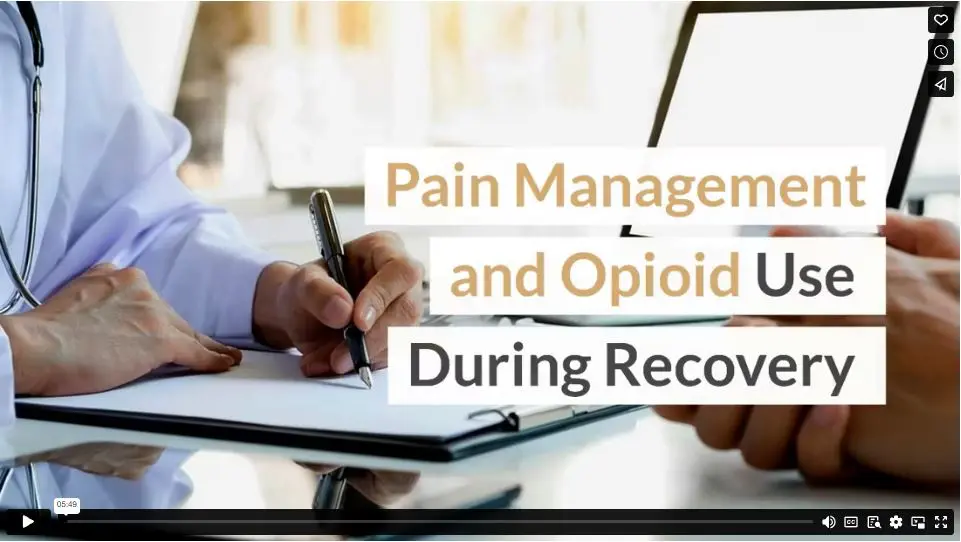Meet Dr. Peter. He is a physician in his 10th year of recovery from opioid abuse. One day, he slips on ice and tears his left quadriceps tendon. The pain is unbearable. His doctor prescribes Oxycodone, which just happens to be one of the drugs he was previously addicted to. She also gets his partner involved by having them manage the distribution of the drug.
Wait a minute. What is this prescribing doctor doing, giving a former opioid abuser opioids? Hold that thought.

(Towfiqu barbhuiya / unsplash)
Now let’s talk about David.
David is a young stockbroker who recently celebrated his 10th year sober from alcohol addiction. One day, he’s playing hockey with his buddies and takes a hard fall on the ice, injuring his back. After a week on bed rest, cyclobenzaprine, and Oxycodone, his regular doctor puts him back on tramadol, a non-scheduled drug. David’s pain increases sharply, and he asks for something more potent, so his doctor prescribes a short-term course of hydrocodone. David claims the hydrocodone isn’t working and that he can’t function because of his pain. He pleads with his doctor to give him a prescription for Oxycodone. David’s physician knows his past and thinks he could be dangerously close to a relapse, so he stands by his original prescription and refuses to give David Oxycodone.
A Brief History
We have here two similar vignettes. The doctor’s actions in each story, however, differ significantly. This difference dates back to the 1990s, when prescription opioids became the go-to painkillers for most doctors. Pharmaceutical companies who manufactured the opioids assured doctors and other medical professionals that these drugs weren’t addictive, which led to a steep increase in prescriptions for everything from surgery recovery to muscle spasms.
Emergency rooms and drug rehabs soon revealed that opioids were indeed addictive and deadly when used in excess. In 2017, after opioid overdoses had already killed tens of thousands, the Department of Health & Human Services declared the opioid crisis a public health emergency. In a 2019 National Survey on Drug Use and Health, more than 10 million people reported that they had misused prescription opioids in the past year, and 1.6 million people admitted to having an opioid use disorder.
Although the Centers for Disease Control saw drug overdose deaths beginning to decline in 2018, the COVID-19 pandemic seems to have reversed that trend. The CDC reported 81,000 drug-related overdose deaths from May 2019 to May 2020, the highest ever recorded for that length of time. The opioid crisis has forced the medical profession to take a much closer look at what conditions merit opioid use and for how long, especially since research shows longer-term use has higher addiction potential. Many physicians also have turned to more non-opioid resources for chronic pain, like epidurals, non-steroidal anti-inflammatory drugs, acupuncture, electromyography, and cognitive behavioral therapy.
So all this information leaves our two doctors in a bit of a quandary. They each have a patient with a substance abuse history. At the same time, their patients also find themselves in severe physical pain with no short-term alternatives other than prescription opioids. These doctors don’t want their patients to relapse. Nor do they desire to face possible future negligence charges for prescribing addictive drugs to a recovering substance abuser.
The Rest of the Story
Given his personal history, Dr. Peter resisted using the Oxycodone at first but eventually realized the drug was his only shot at pain relief. His partner at home dispensed the medication as directed, and Dr. Peter checked in regularly with his support network. The Oxycodone did the work it was designed to do, did not cause a “high,” and was surprisingly easy to stop taking. Dr. Peter remains sober.
David, on the other hand, did not do so well. With his pain left unchecked, he again turned to alcohol for relief. He fell into a depression and separated himself from his support network. Finally, his self-medication escalated to the point where he suffered a total relapse. He lost his job and his family.
Two similar situations, two very different outcomes. There are a few reasons why Dr. Peter’s story (which is true, and you can read more about his journey here) ended happily. To begin with, he worked with one doctor who was very familiar with him and his abuse history. When working with opioids for pain management in former substance abusers, it’s critical to have one central physician overseeing treatment. In David’s case, his ER doctor prescribed a course of drugs that was working well. His regular doctor later switched him over to less effective pain medication, throwing his injury recovery off track.
Secondly, Dr. Peter could limit his dosage to only what the doctor prescribed, as his partner controlled the disbursement. When he experienced cravings, temptations, or felt weak, he relied on his recovery support network for help and encouragement. When David couldn’t get the pain relief he needed, he began to self-medicate in an uncontrolled environment. Instead of reaching out to his support network for help, he turned inward, thus feeling alone, isolated, and probably ashamed of his relapse into alcoholism.
Our Takeaway
Accidents happen, and former substance abusers have as much right to effective pain management as anyone else. Keeping both your pain in check and your recovery intact comes down to hands-on management and outside support. As with your substance abuse recovery, you shouldn’t have to handle your physical recovery on your own.
It’s not enough that the CDC has delivered updated dosing guides to doctors. Or that medical schools like Brown University continually introduce new and expanded curricula on opioid and other substance abuse. These actions help considerably, but in the end it’s up to you to lean on your addiction recovery center professionals and other medical supports to effectively navigate your short-term opioid use for pain relief.
We at Renaissance Ranch have seen addiction in all its forms and are ready to help you on your recovery journey. For more information, contact us at (855) 736-7262 or at renaissanceranch.net.
Video

